When trying to find the perfect camper for you, there’s tons of factors to consider, one of the most important of which is weight. Travel trailers can be constructed of extremely heavy materials (some of them weigh over 11000 lbs!), which may limit certain aspects of how you get to explore the world in your RV.
Finding the right lightweight one will afford you SO much more flexibility- so, if you’re in the market for a travel trailer, here’s 4 reasons campers under 3000 lbs are an awesome choice- plus several different options for you to consider!
This post may contain affiliate links. If you make a purchase through them, we may receive a small commission, for which we are extremely grateful, at no extra cost to you.
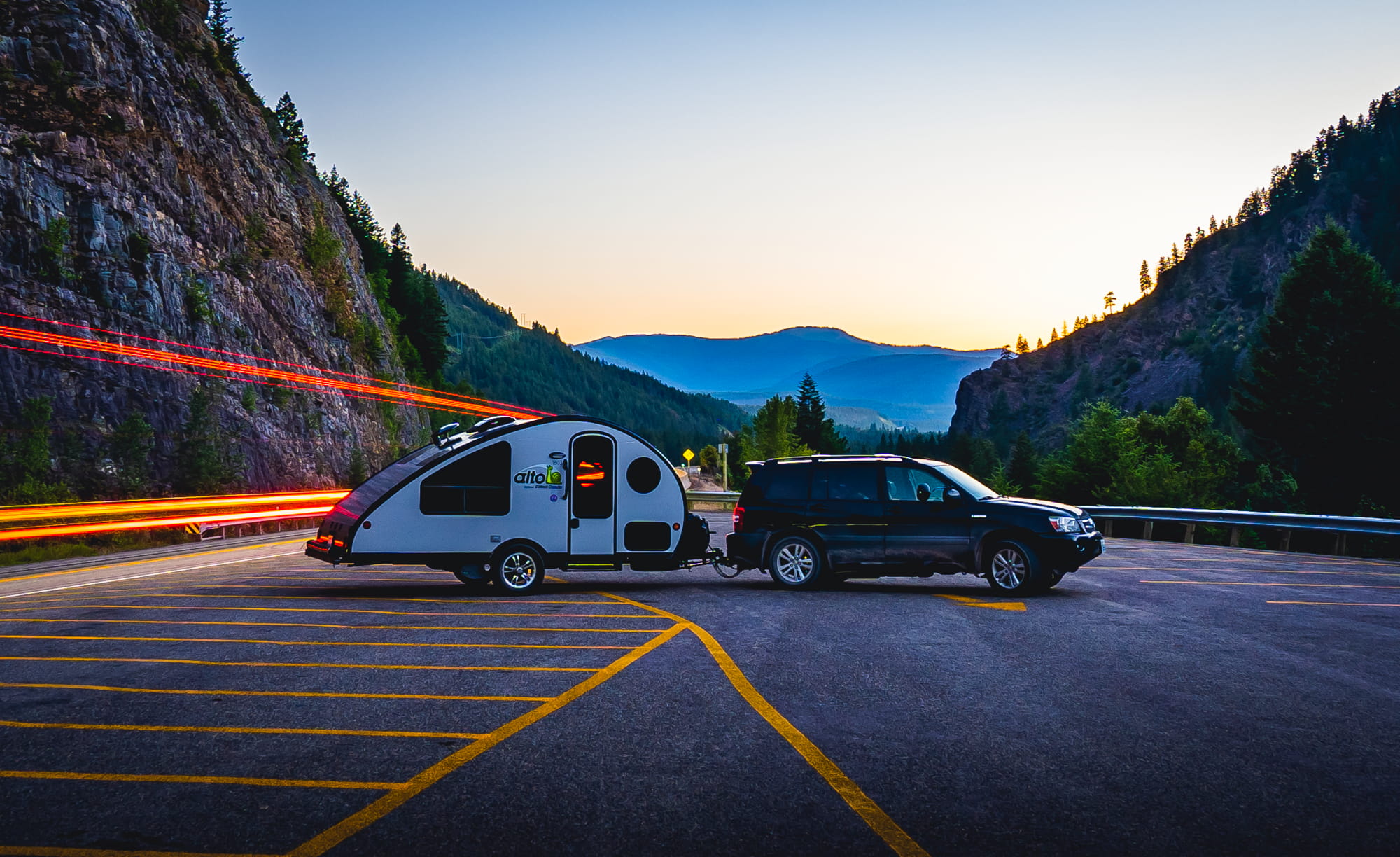
Campers Under 3000 Lbs to Consider
When my husband, Justin, and I were looking to purchase a trailer, we knew we wanted something compact and fairly lightweight. We live in Seattle, where real estate is at a premium, in a townhouse, with a one car garage and a driveway we share with two neighbors.
Given that storage was always going to be something of an issue for us and also that we planned on generally just using our trailer as a place to cook food and rest our heads at night, getting a massive, heavy trailer with all of the bells and whistles just didn’t make a ton of sense for us. So after doing a ton of research and watching countless YouTube videos, we fell in love with and eventually purchased the Safari Condo Alto trailer.
Safari Condo is a family-run Canadian manufacturer that produces trailers designed with aerodynamics in mind and constructed on a ultra-lite aluminum frame. They have several models of the Alto, ranging from 17 feet to 24 feet in length, and some with (and some without) retractable roofs. Our model is the R1723, a 17-foot camper under 2000 lbs (dry) with a retractable roof and a wet bath. In fact, all Altos campers, even the 24-foot ones, weigh under 3000 lbs. dry!
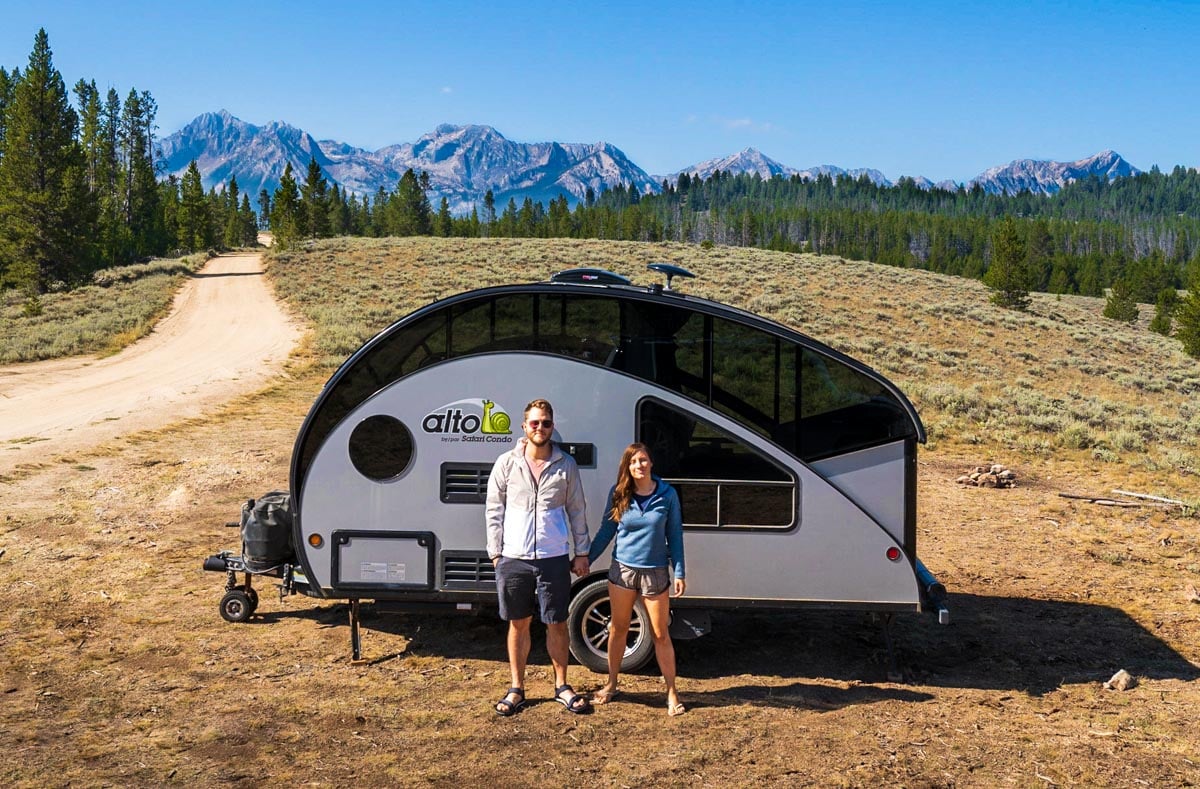
Ultimately, we chose our Alto for a number of reason (e.g., build quality, the retractable roof which allows us the ability to store our trailer in our garage, and THOSE WINDOWS), but some other campers under 3000 lbs we considered:
- Scamp trailers, with their iconic fiberglass bodies, have a delightfully retro cool vibe and are reportedly really well-constructed. The 13-foot model has a dry weight of up to 1600 lbs and the 16-foot model weighs up to 2,600 lbs dry.
This model has been around since the 1970s and over the years, Scamp has really perfected the design of these trailers- on the flipside of this, however, some owners have complained that the trailers haven’t been sufficiently modernized enough during that time, with amenities like sufficient USB ports or bright lights. - Casita trailers are built similarly to Scamps, with a fiberglass body, and come in five different models, all of which weigh between 1,970 and 2,480 lbs dry and either 16- or 17-foot in length. Casitas are known for having excellent build quality and durability. Some Casita owners complain that the layout of their camper is overly cramped, but with so many different models to pick from, I’m not certain that’s a totally fair criticism.
It’s important to note here that all of the above-listed weights are dry weights, meaning they don’t include the weight of food or luggage that you store in your trailer, or any liquids stored in the fresh, gray, and black holding tanks. All of this can add up really quickly so if you’re looking for campers that are truly under 3000 lbs , you’ll realistically need to focus mainly on models that are around or under 2000 lbs dry. It’s also worth mentioning a manufacturer’s reported weight may exclude optional upgrades like microwaves or air conditioning units.
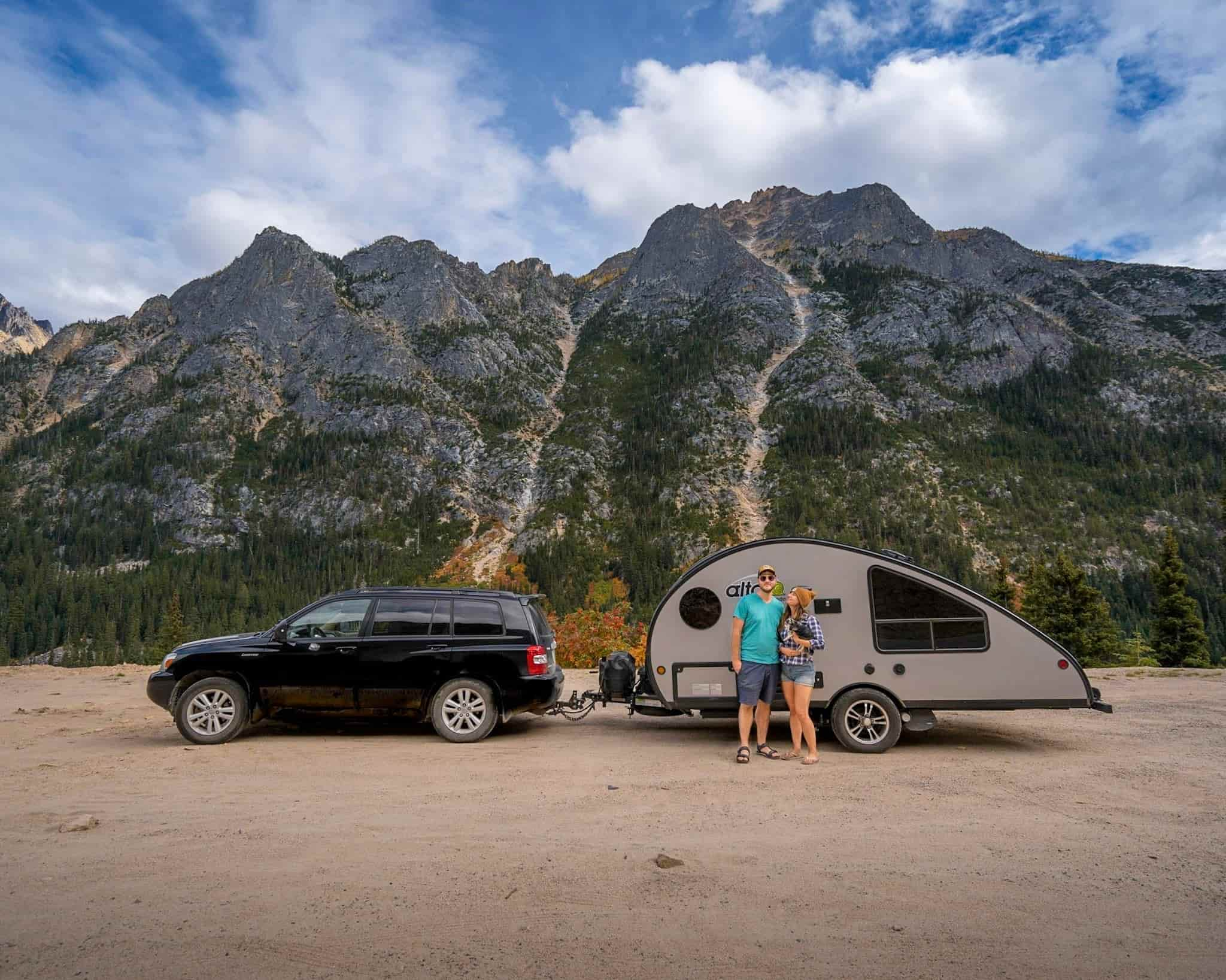
With that context in mind, here are two other campers we considered that are just under 3000 lbs dry:
- The Airstream Bambi would be the frenemy of the Safari Condo Alto in the RVing world- lots of folks like to pit these two little trailers against each other. The 16-foot Bambi has the endlessly cool design and great build quality that Airstream is known for, but with prices starting at $56,500 and a dry weight at 3,000 lbs, it wasn’t the best fit for our family.
- The only trailer that has made my eyes wander a bit from the Alto that we’ve seen out in the wild is a Tab 400 with Boondock Package, a teardrop camper seemingly designed for folks that, like us, prefer boondocking (check out its dreamy ground clearance!). But with a dry-weight of 2876 lbs and reported hit-or-miss issues with construction, I’m staying faithful to my Alto. It’s worth noting this company also manufactures a slightly smaller model (15 foot in length), the Tab S with Boondock Package, which would be ideal for 1-2 people and weighs in at 1946 lbs dry.
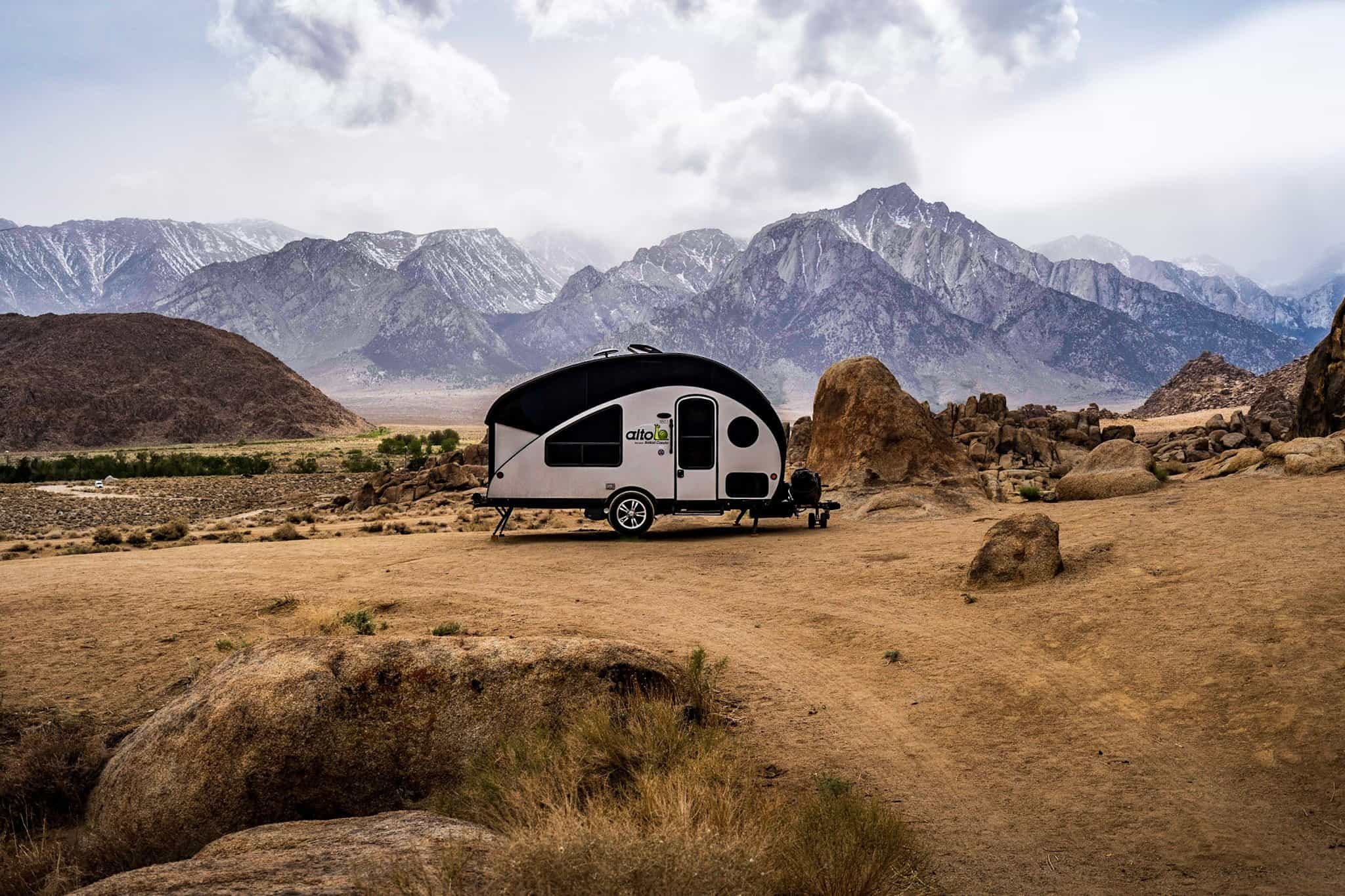
Psst… are you interested in a Safari Condo Alto? I don’t blame you- they’re pretty damn cool. You might be interested in some of the other articles I’ve written about the Alto:
- We Bought a Travel Trailer
- Review of the Safari Condo Alto: Six Things I Love and Six Things I Don’t
- Safari Condo Alto Tour: Take a Peek Inside My Trailer
- How Much Does it Cost to Buy a Travel Trailer?
Reasons Why You Should Buy a Camper Under 3000 Lbs
If you’re reading this article, you probably know that finding campers under 3,000 lbs isn’t easy- or cheap. Most modern RVs, especially ones that are more affordable, are framed with wood, a material that is notoriously prone to water damage and is also extremely heavy. In fact, the average travel trailer weighs 5,200 lbs dry!
So is the higher upfront price for campers under 3,000 lbs worth the investment? We think so and here are some reasons why.
1. You have more options for your tow vehicle.
One of the huge benefits of a travel trailer over other types of RVs is that you can theoretically use your daily driver to tow your RV to wherever you want to go and then use your vehicle to get around once your trailer is dropped at your campsite (I could talk about this benefit at length- in fact, I actually did in this post about why towing a travel trailer is better than vanlife). But if your trailer weighs 5,000-plus lbs., your options of what kind of tow vehicle you have dwindles mostly to heavy duty trucks with really high towing capacity.
With campers under 3,000 lbs, you have a lot more options of vehicles capable of towing that kind of weight, including mid-size SUVs and smaller trucks. It pained me to trade in our Toyota Prius-C for something with a bit of towing capacity (goodbye, 45 mpg!), but I love that our Toyota Highlander Hybrid can tow our Alto up steep mountain passes, but also get 29 mpg once we’ve dropped it off at the campsite.
If we had to trade in our Prius-C for some kind of monster truck capable of hauling a 5,000 lbs. trailer as our daily driver, not only would that absolutely kill our fuel economy, but it wouldn’t have been a practical choice for living in and navigating the narrow streets of Seattle in our day-to-day life.

2. You’ll get better gas mileage.
I’m going to be honest- unless you have an electric vehicle, your gas mileage is going to suck while towing, whether you have a 2,000 lbs. trailer or you have a 5,000 lbs. one. But it isn’t rocket science that the less your trailer weighs, the less gas you’ll burn through when towing. No, really- for every 100 lbs. of extra weight you’re towing, you can expect to decrease fuel efficiency by about 2%.
Stopping all the time to fuel up is not only expensive, but bad for the planet and makes getting from Point A to Point B take MUCH longer than it otherwise would. Less money spent on gas and less opportunities for me to be tempted to buy Takis at each gas station? Win-win for everyone!
3. Lighter trailers are easier to tow.
Towing a trailer can be uniquely challenging, with simple tasks like turning, backing up, and navigating next to a gas station pump taking on a whole new level of complexity (if you’re new to towing, you might want to check out our post with tips for towing a travel trailer for the first time). While these challenges still exist with lightweight trailers, some issues, like trailer sway (i.e., when your trailer and tow vehicle are wiggling back and forth due to wind, road conditions, or other passing vehicles), are much easier to correct when your trailer simply weighs less.
Theoretically, Justin and I could get away with not having weight distribution bars on our SUV while towing the Alto (we still use these and love ‘em!), but weight distribution bars are usually necessary if you’re towing heavier trailers. Similarly, with a lightweight trailer, you can stop your tow vehicle more quickly upon braking suddenly when you see an accident up ahead or an animal dashes unexpectedly in front of your car. The easier it is to haul your trailer, the less emotionally- and mentally-taxing towing will be, and thus, safer for both you and everyone on the road.

4. The compact nature of lightweight trailers are easier to store and adventure with.
Admittedly, this one is more indirectly related to being a lightweight trailer, but since weight and the overall design of the trailer go hand-in-hand, I’ll include it here- campers that weigh under 3,000 lbs are generally going to be fairly compact (typically around 17 foot in length or less), which will be easier to store, more capable of getting in tighter campsites, and easier to set up and break camp.
Since we started traveling with our camper, I’ve seen all kinds of RVs, from converted school buses to enormous Class A motorhomes, and lots and lots of travel trailers, which are usually around 20-24 foot long, and oftentimes, come with wide slide-outs.
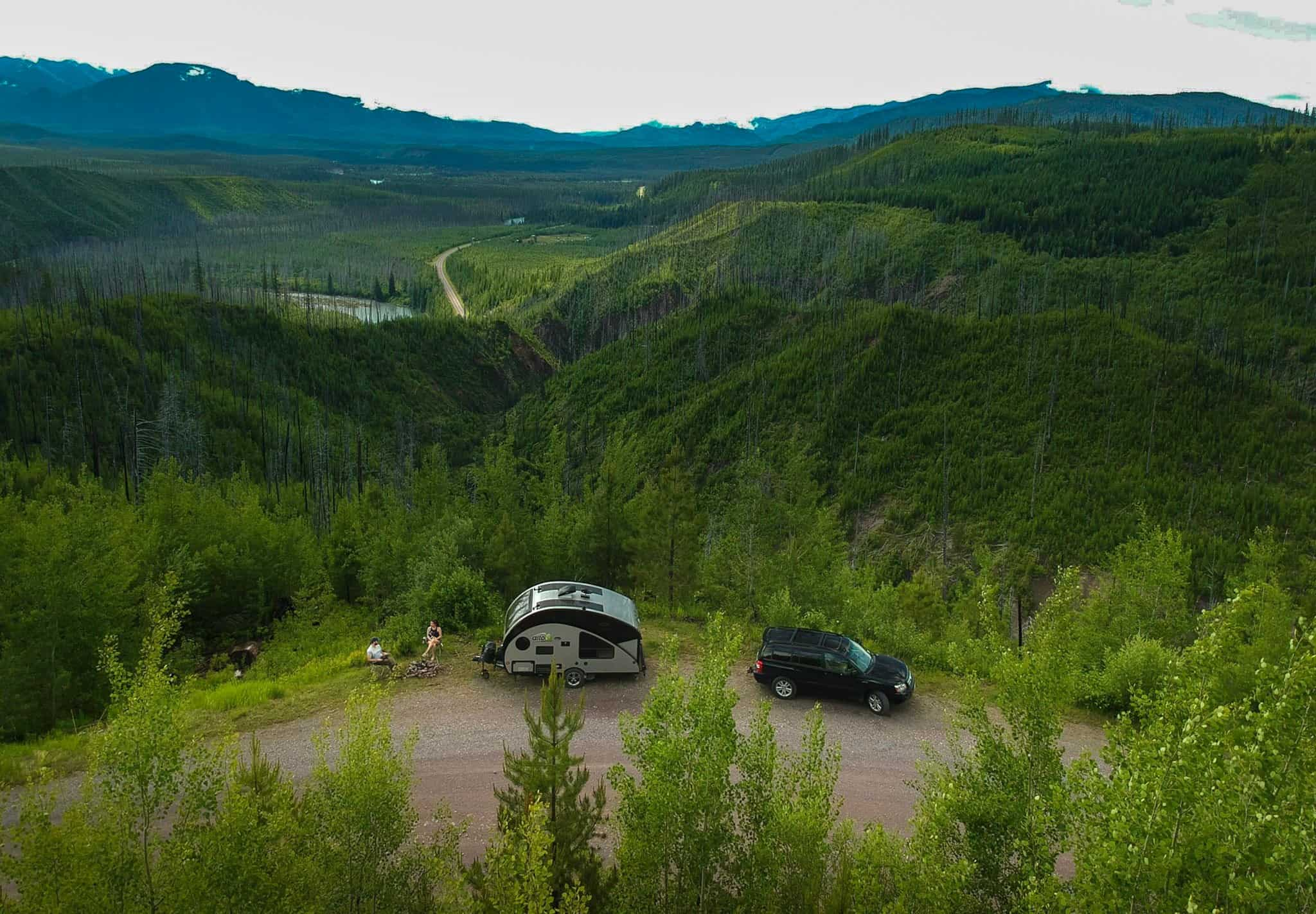
There’s been SO many times I’m grateful for the nimbleness that having a smaller trailer has afforded us, as opposed to if we were driving one of these bigger rigs- from navigating down narrow, bumpy National Forest roads, to squeezing in the last tent site available at a campground and being able to store our trailer in our garage.
And without having to worry about things like slide-outs or other bells and whistles, we can usually set up and break down camp (including hitching up our trailer) in about 15 minutes. An RV should essentially function as your adventure mobile- and having a compact trailer helps you get to and from your adventures more quickly and easily.
We hope this post helps find the right camper for you. What models are you considering and why? Are there any benefits to a lightweight trailer that I missed? Let me know in the comments below!
Thank you for reading our post! Check out our latest stories here and follow us on Instagram (@UprootedTraveler), YouTube, or on Facebook to see what we’re up to next!



For those planning a getaway, keep in mind that most travel trailers have a dry weight of about 5,000 pounds. Dry weight excludes any gear you might bring along.
Hi Bruno,
You’re absolutely right that most trailers have a dry weight of about 5,000 pounds (or even more!). However, we’ve had three Safari Condo Alto trailers at this point, all of which have weighed under 3,500 pounds with full holding tanks and all the add-ons (we’ve went on to truck scales to confirm!). Lightweight trailers are definitely out there- you just have to sacrifice some on the space and comforts and often get comfortable with a higher price point.
Thanks for reading!
Jess